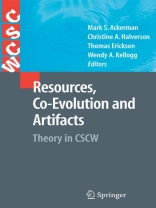A topic of significant interest to the CSCW, IT and IS communities is the issue of how software and other technical systems come to be adopted and used. We know from considerable research that people use systems in many ways, and that the process of incorporating them in their everyday activities can require a great deal of effort. One way of understanding adoption and use is by considering artifacts as resources in people’s environments.
‘Resources, Co-Evolution and Artifacts: Theory in CSCW’ looks at how resources get created, adopted, modified, and die, by using a number of theoretical and empirical studies to carefully examine and chart resources over time. It examines issues such as: how resources are tailored or otherwise changed as the situations and purposes for which they are used change; how a resource is maintained and reused within an organisation; the ways in which the value of a resource comes to be recognised and portrayed; the ways in which an artifact is transformed to enable it to function more effectively as a resource; the ways in which an artifact’s usage practices evolve as it becomes recognized as a resource; how one might approach the problem of designing a resource de novo; the ways in which opportunistic use of an artifact transforms it into a new kind of resource.
Table of Content
Artifacts and Their Development.- The Birth of an Organizational Resource: The Surprising Life of a Cheat Sheet.- The Zephyr Help Instance as a CSCW Resource.- Co-Realization: Toward a Principled Synthesis of Ethnomethodology and Participatory Design.- Figuring Out How to Figure Out: Supporting Expertise Sharing in Online Systems.- Contextualizing Influences–Language, Trust, and Time.- Representational Gestures as Cognitive Artifacts for Developing Theories in a Scientific Laboratory.- Distributed Cognition and Joint Activity in Computer System Administration.- Representation, Coordination, and Information Artifacts in Medical Work.- Theorizing: Coordination, Co-realization, and Structuration.- Reach, Bracket, and the Limits of Rationalized Coordination: Some Challenges for CSCW.- Down in the (Data)base(ment): Supporting Configuration in Organizational Information Systems.- Using Technology and Constituting Structures: A Practice Lens for Studying Technology in Organizations.- Reflections and Conclusions: Toward a Theory of Resources.
About the author
Written by senior researchers in CSCW. Wendy Kellogg is one of the founders of Human-Computer Interaction and CSCW.












